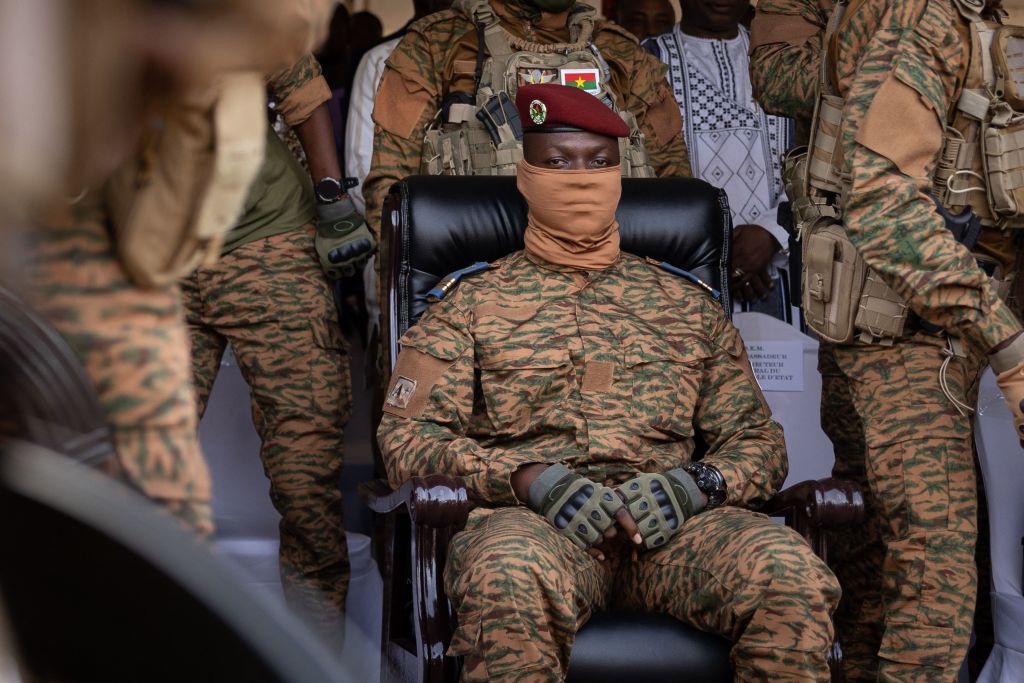Russia Eager to Exploit a Second Coup in Burkina Faso
ADF STAFF
Two military coups in eight months in Burkina Faso have failed to deliver promised security but may be opening the door to greater Russian interference.
Between the coup at the end of January and the second coup in September, terrorist attacks increased by more than 100% compared to the same period in 2021 — 3,244 people killed compared to 1,545 — according to the Armed Conflict Location & Event Data Project.
More than 2 million people in Burkina Faso have been displaced by insurgent violence since 2015.
“It feels like deja vu,” Sahel expert and Clingendael Institute researcher Constantin Gouvy told The Washington Post. “It was pretty much the same story as in January — except the only difference is that this was a coup-within-a-coup.”
Burkina Faso’s latest leader is the young Army Capt. Ibrahim Traore, 34, who deposed Lt. Col. Paul Henri Damiba on September 30.
Days before the September coup, he was a relatively low-ranking officer running an artillery regiment in a small town in northern Burkina Faso.
Now, the Traore-led military must address the violence linked to al-Qaida and the Islamic State. He also must answer to the throngs of Burkinabe citizens who showed their support by greeting him in the streets.
They cheered, lit fires, waved Russian flags and shouted anti-French slogans in the capital Ouagadougou. Some attacked the French Embassy.
One day after Traore’s coup, an official representative of Russian military trainers in the Central African Republic (CAR) offered training to the Burkinabe military.
Russian oligarch Yevgeny Prigozhin, founder of the private military company called the Wagner Group, congratulated Traore on his coup.
“I salute and support Captain Ibrahim Traore,” he said in a statement, calling Traore “a truly worthy and courageous son of the motherland” while stoking anti-French propaganda.
These public statements of support mark a departure from Russia’s typical response to regional instability, according to analyst Samuel Ramani of the security think tank the Royal United Services Institute. He has authored a book titled, “Russia in Africa: Resurgent Great Power or Bellicose Pretender?”
“In previous coups Russia has tried to position itself as an accidental beneficiary of regime changes,” he told the BBC. “This time around Russia is a lot more proactive in support for the coup, and that has led to speculation that Russia has played a coordinating role.”
The Wagner Group has a track record of causing violence and instability in CAR and Mali. It has been linked to at least six civilian massacres, including the summary executions of 300 people in Mali’s Moura village.
Earlier this year, France withdrew from Mali after its military junta leaders turned to Russian mercenaries for help in the fight against Islamist militants.
French foreign ministry spokeswoman Anne-Claire Legendre said the tactics employed by the Russian mercenaries, known across the continent for committing war crimes, will only create more terrorists as they carelessly kill civilians.
“What we observe is that elsewhere in Africa today there are worrying deployments of the Wagner militias,” she said on October 7. “We have been able to see on the ground that the effects of these militias lead to abuses of the population. We saw crimes that unfolded in Mali, in the Central African Republic, in Mozambique.
“Also, [we saw] the pillaging of natural resources, and most of all, zero effectiveness in the fight against terrorism.”
The pro-Russian and anti-French sentiment that has buttressed both of Burkina Faso’s juntas has its roots online, where calls for Russian intervention have grown louder with each coup.
Investigators from the Atlantic Council’s Digital Forensic Research Lab found clear evidence of Russian disinformation campaigns earlier this year.
Rida Lyammouri, senior Sahel advisor at the Policy Center for the New South, believes there is still time to negotiate with Burkina Faso’s new junta, but the presence of Wagner mercenaries in the country would change that calculus and signal a victory for Russian propaganda.
“After the arrival of Wagner, it’s too late,” he said during an October 4 panel discussion on France 24. “France has struggled to effectively counter the increased disinformation campaign by the local news channels and social media supported by Russia.
“That is why we are seeing people in Ouagadougou, just as we saw in Bamako before, protesting against France, burning their flags and carrying the Russian flag.”
Rinaldo Depagne, West Africa project director at the International Crisis Group, foresees grave danger if Burkina Faso contracts with the Wagner Group.
“Russia is certainly closer to now cut a deal with Burkina than ever, certainly than they were with Damiba,” he told Foreign Policy magazine. But “what we see in Mali is that Russia does not bring more security or improvements in the situation.
“The Russian army in Ukraine is not doing well, and in Mali, the Wagner Group is not doing well at all.”


Comments are closed.